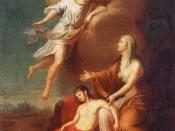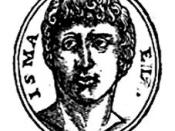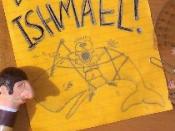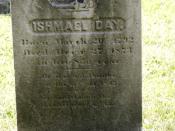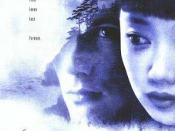Parents have the responsibility of raising their children in a just and moral manner. Mothers and Fathers place their values and beliefs in their children, and these values and beliefs effect how each child will act and react to life's situations. The racial views of parental figures have an influential role in David Guterson's novel, Snow Falling on Cedars. Ishmael, Hatsue and Kabuo are all affected by parental figures in the novel; this theme is prevalent: Ishmael and Hatsue are influenced by their own parents, and Kabuo by the mother of Carl Heine, the man he is accused of murdering.
Ishmael's parents have a positive effect on Ishmael's racial views. Ishmael's parents influence him through their views and beliefs about racism. Ishmael's father, Arthur, is dead at the time that the novel takes place. Although he is not physically present at the time, his past actions greatly influence Ishmael's way of thinking and reacting.
Arthur's feelings toward the Japanese-American citizens of San Piedro Island are known throughout the community. The Japanese respect Arthur because of his fairness towards the Japanese and his impartiality towards the white members of the community: "I wish to say,' said Masato Nagaishi, "that the Japanese people of San Piedro Island are saddened by the death of your father. We have always had great respect for him as a newspaperman and as a neighbour, a man of great fairness and compassion for others, a friend to us and all people"ÃÂ (Guterson 352). Nagaishi says this on behalf of the Japanese community of San Piedro Island. Due to the fact that Ishmael's character remembers this incident so vividly indicates the strong impact this statement has on him and pushes him further away from feelings of racism against the Japanese people. When Ishmael goes through the traumatic loss of his arm in World War II, he feels bitterness and hate towards the Japanese people. When Ishmael discovers evidence of Kabuo's innocence, his hate causes him to struggle with his feelings and morals. While contemplating the evidence and the fate of Kabuo, Ishmael thinks of father: "He was, his son remembered morally meticulous, and though Ishmael might strive to emulate this, there was nevertheless this matter of the war- this matter of the arm he'd lost- that made such scrupulosity difficult"ÃÂ (35). Throughout the novel Ishmael strives to be like his father who treated the Japanese fairly and equally. Although the loss of his arm causes Ishmael bitterness, his father's influence forces him to do the right thing. In the end, Ishmael decides to release the evidence that will clear and prove the innocence of Kabuo, a Japanese man. Without the extreme kindness and morality that his father showed, Ishmael likely would not have made this decision. Ishmael's mother, who is present during the time of the novel, also has a fairly positive influence on Ishmael. Like her husband, her comments and feelings push Ishmael to come forward with the evidence that clears Kabuo's name. "It's a shame,' says his mother, "ÃÂI have to think it's a travesty. That they arrested him because he's Japanese"ÃÂ (343). Ishmael's mother is referring to Kabuo. Soon after she states her opinion openly and honestly to her son does Ishmael turn in the evidence. Without the influences of both Ishmael's father and mother, he would not have chosen the turn towards morality that he does, and Kabuo, an innocent man, would have been convicted of murder.
While Ishmael's parents have a positive effect on his views, Hatsue's rolemodels have a negative effect on her racial views. Hatsue's mother's views on racism greatly effect Hatsue's decisions throughout the novel. When Hatsue reminisces about her childhood, the reader is shown how strongly rooted in Japanese tradition Hatsue's mother, Fujiko is. Fujiko sends Hatsue to Mrs. Shigemura, a woman who teaches young Japanese girls like Hatsue how to remain Japanese in both mind and body. "When she was thirteen her mother had dressed her in a silk kimono and sent her off to Mrs. Shigemura, who taught young girls to dance odori and to serve tea impeccably"à(82). Mrs. Shigemura emphasizes the importance of staying traditionally Japanese, and tells her to marry only one type of man- a Japanese man. Hatsue's mother clearly knows that this is what Hatsue would learn from Mrs. Shigemura. Even though Hatsue was born in America, and therefore is an American citizen, her mother wants her to think of herself as a Japanese citizen, totally separated from the American culture that they live in. Fujiko attempts to put a boundary between the Japanese people of San Piedro Island and the "hakujin"à(white) members of San Piedro. "And her people, insisted Fujiko, were Japanese- the events of the last two months had proved so"æit should teach them something about the darkness in the hearts of the Hakujin and the more general darkness that was part living"à(200). Fujiko believes that she is truly a Japanese citizen, although she is Japanese-American. She is also convinced that Hatsue and the rest of the American-Japanese community are Japanese citizens. Fujiko attempts to force her beliefs on Hatsue, and emphasizes that Hatsue is totally different from the "white"àrace. This makes Hatsue wary of white citizens, and creates the idea that all white people are evil and not to be associated with. Therefore, Fujiko's opinions influence Hatsue's relationship with Ishmael, who is a white man. At one point in the novel, Fujiko distinctively orders Hatsue to leave Ishmael alone: "Fujiko took his letter from her daughter's lap and ripped it neatly down the middle. "ÃÂWrite your own letter,' she said in Japanese. "ÃÂTell him the truth so you can move forward. Put this hakujin boy away now"à(231). Fujiko seems to decide on Hatsue's relationship by pushing her to forget Ishmael. She also refers to Ishmael as "this hakujin boy,"àconveying her obvious disapproval of his race. Hatsue eventually rejects Ishmael and marries and falls in love with Kabuo- who is Japanese. Although Hatsue falls in love with Kabuo and marries him, her mother Fujiko has a significant influence on her decision in leaving Ishmael and marrying a Japanese man.
Another primary character in the novel, Kabuo, is affected by the racial views of a parental figure in his life. Kabuo is greatly influenced not by his own parents, but by the mother of the man he is accused of murdering, Carl Heine's mother. Carl's mother Etta plays a large role in what happens to Kabuo in the novel. Etta is very hateful and mistrusting towards the Japanese people of the island. She looks down on the Japanese citizens of San Piedro Island: "We're not such paupers as to sell to Japs, are we?"ÃÂ (119). This is said by Etta referring to the land her husband wants to sell to Kabuo's father, which he eventually does. Etta's feelings towards the Japanese are clear, and these feelings of hatred push her to sell the land that belonged to Kabuo's family without their knowledge. Etta's action of selling the land ruins Kabuo's carefully laid plans for the future. As a result, Kabuo decides to become a fisherman. This occupation eventually
